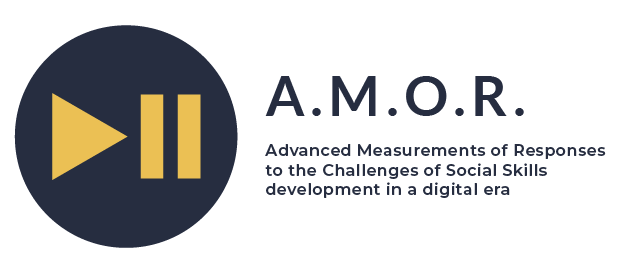
Project number: 2022-2-DE04-KA220-YOU-000098221
Implementation period: 01.06.2023 – 25.04.2025
Assistance program: Erasmus+
Project description
In the face of the COVID-19 crisis and the challenges facing educational institutions, the education sector as a whole needs short-term solutions that can be used to respond to this and possible future crises.
The A.M.O.R. (Advanced Measurements of Responses to the Challenges of Social Skills Development in the Digital Era) project responds to this need.
The project’s activities focus on developing solutions targeting the social skills gap and the digital divide, particularly highlighted by the Covid-19 pandemic, for people with disabilities and students with special educational needs who have been widely excluded from digital and non-digital solutions developed in recent months, mainly due to their inaccessibility and lack of inclusion.
Through the implementation of the A.M.O.R. project, teachers, trainers, and social workers will be able to help young people, especially those with disabilities and special educational needs, to overcome the perceived or real lack of control over their situation and to strengthen active social participation and combat current negative trends of exclusion.
The A.M.O.R. partnership wants to provide innovative and practical pedagogical solutions for inclusive youth digitization and social work in informal and formal settings.
Target group
- Primary Target Group (TG1)
YOUTH and Social Workers as well as other educators in the field of YOUTH work, e.g. teachers, trainers, coaches
- Secondary Target group (TG2)
YOUNG people with physical and mental disabilities and/or SEN in Europe facing the challenges enforced through the Covid pandemic
Project results
- WP2: A.M.O.R. Good Practice Catalogue– A separate document available to the public and especially recommended for young people and social workers, as well as other education professionals. The document will consist of well-structured tools, activities, and practices from all partner countries and will conclude with a ‘lessons learned’ section analyzing different needs, e.g. skills of the people involved, methodology, and inclusive approaches to people with disabilities.
- WP3: M.O.R. Digital Handbook – The innovative digital handbook of the A.M.O.R. project is a separate publication with many chapters for different purposes, which can be easily extended after the project (local versions). It will be freely available to the general public and especially recommended for educational staff and students with and without disabilities.
Partners
IB-Internationaler Bund – IB Mitte gGmbH für Bildung und
Soziale Dienste Niederlassung Sachsen – Chemnitz , Germany(coordinator)
MCC-Celjski Mladinski Center,Javni Zavod za Mladinsko Kulturo,Izobrazevanje,Informiranje in Sport–Celje , Slovenia
TFN-Sdruzhenie Badeshteto Sega – Sofia,Bulgaria
Calasanz-Calasanz Santurtzi S.L.– Santurtzi, Spain
Danmar Computers– Rzeszów,Poland
AEVA-Associaco Para a Educacao e Valorizacao da Regiao de Aveiro-Aveiro,Portugal
Yes Forum- Yes Forum Ewiv- Youth and European Social Work Forum-Stuttgart, Germany
Web: https://amor.erasmus.site/

